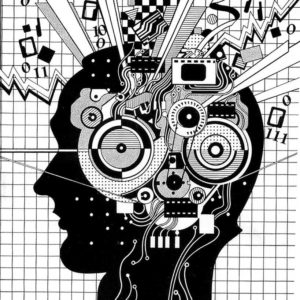 I have been wriggling against the sci-fi label since I accidentally wrote my first sci-fi novel a decade ago. I didn’t mean to write sci-fi, but the story had an AI android in it. I don’t even like sci-fi.
I have been wriggling against the sci-fi label since I accidentally wrote my first sci-fi novel a decade ago. I didn’t mean to write sci-fi, but the story had an AI android in it. I don’t even like sci-fi.
I’m a cognitive psychologist who left the academic life for the computer industry to find out if the mind is like a computer. I started writing fiction to dramatize what I discovered about human and AI mental capacities. To do that, in my stories I often use a robot or an alien as a contrast character, because “It takes an alien to understand humans.”
It’s extremely difficult to explain to people, and agents too, that my novels are not really sci-fi. They involve no alien invasions, space battles, plasma guns, warp drives, or rampaging robots. Instead, they are stories about consciousness and its vicissitudes. I stick pretty close to actual technology and AI concepts, with just a little exaggeration.
Where I stretch is in psychological descriptions and explanations, of perception, dreaming, memory, motivation, imagination, creativity, agency, socialization, empathy, and above all, the mind-body problem (how does the immaterial mind connect to the physical body?).
I use robots and aliens the way genetic scientists use “knockout mice,” with a few specific genes disabled or “knocked out” in order to see what those genes do. An android, for example, might be just like a human except lacking in intuition. How would that show up? It’s not about the robot. It’s about human psychology. Try explaining that to your dog.
I’ve strained to find comparable work in the literature. There are some classics, going back to Clarke, Heinlein, and Asimov, that put human psychology at the forefront, but not much in current work. Judging from what’s getting published (by surveying Publishers Marketplace), I would say that 95% of today’s sci-fi is actually in the category of fantasy, and indeed most bookstores shelve sci-fi and fantasy together.
The average reader doesn’t know much about science and cares less. Fantasy is what they want. I described one of my novels to an agent at a conference and his first question about my main character, a physician, was, “What’s his special power?”
There might be, should be, more interest in the mysteries of the mind than there is in science and engineering, because I know for sure that every reader has a mind and a body. All I have to do is make them realize that’s a highly problematic way to exist.
So I’m hereby declaring a new genre: “Psi-fi,” where “psi” stands for psychology (which is not a real science, regardless of what they tell you). The term is already in light use, but not in a literary sense, as far as I can tell.
A scientific interest group in Lahore is called psi-fi (www.facebook.com/LUMSPsiFi/) but they’re not involved in reading or writing fiction. There’s a “psychedelic music” group apparently obsessed with the I Ching (http://www.psy-fi.nl/) but as far as I can make out, they neither read nor write literature. A professor of philosophy in Texas apparently wrote a study of “the intersections of science fiction, superhero comics, and the paranormal” that incidentally uses the term, “psi-fi.” (http://boingboing.net/2011/01/26/psifi.html). But I don’t find anyone using the term in the way I intend, as a specific genre of psychological fiction against a technological background. So I’m taking it.
Psi-fi is hereby deemed a genre of contemporary literature. Now if only Barnes & Noble agreed with me.
Addendum: 
I really should put forth a psi-fi “manifesto” at this point. Everybody has a manifesto. Alas, I don’t have one. I can however offer a list of just a few topics I consider appropriate to feature in a psi-fi novel:
Perception and reality: what’s the difference?
Chaos and pattern – in the eye of the beholder?
Intersubjectivity and its variants, its absence, its origins
Mortality – what is it?
Memory as fabrication
History as collective memory
Otherness
Time and change (as experienced)
Self-awareness, metacognition and higher-order thought
Consciousness – kinds of, states of, absence of, conditions of…
Consciousness – natural vs artificial
Madness and the social construction of reality
Personality – what is it?
Individuality – myth or reality?
Emotions and feelings. What good are they?
Intuition and conceptualization
Creativity (and counterfactual imagination)
Free will vs randomness vs determinism vs self-delusion
Knowledge, certainty and doubt
Knowledge vs belief
Language: Social construction, language games, Deep structure
Community (family, tribalism, Gemeinshaftsgefuhl)
Music (all the arts) – the proprius, Necker cube, Gestalt formation
The mind-body problem, intercorporeality, Merleau-Ponty
Spatiality and movement: alternatives to Kant? Einstein?
Entropy vs life, vs knowledge vs information
Rationality vs the Dionysian
Logic and reason – was Hume correct? Critical thinking.
Philosophy of science and constructed reality
The Dream that grips us all
The black hole and the folds of experience
Self-relating subjectivity per Hegel
Intentional inexistence per Brentano
Accommodation of the self to reality and vice-versa
Intrinsic motivation
The telos
Egocentricity vs self-transcendence
Radical subjectivity (Ramana Maharshi)
Gibson’s affordances
The ox-herding pictures
The delusion of self-efficacy
Greed – can it be stopped? Mitigated? Excised?
Love vs reason. Why don’t they mix?
Magic – how should it be defined
The Turing test (and its successors)
Convergence of biology and technology vs theory of evolution
The construction and practice of gender
Lies vs truth. Why do we care? – in practice, per Wittgenstein
Science as a special kind of conversation
Sleep
The homunculus
 Could this be the genre slogan? “Use no oil!” Has a nice ring to it, I think – almost as good as a manifesto.
Could this be the genre slogan? “Use no oil!” Has a nice ring to it, I think – almost as good as a manifesto.
